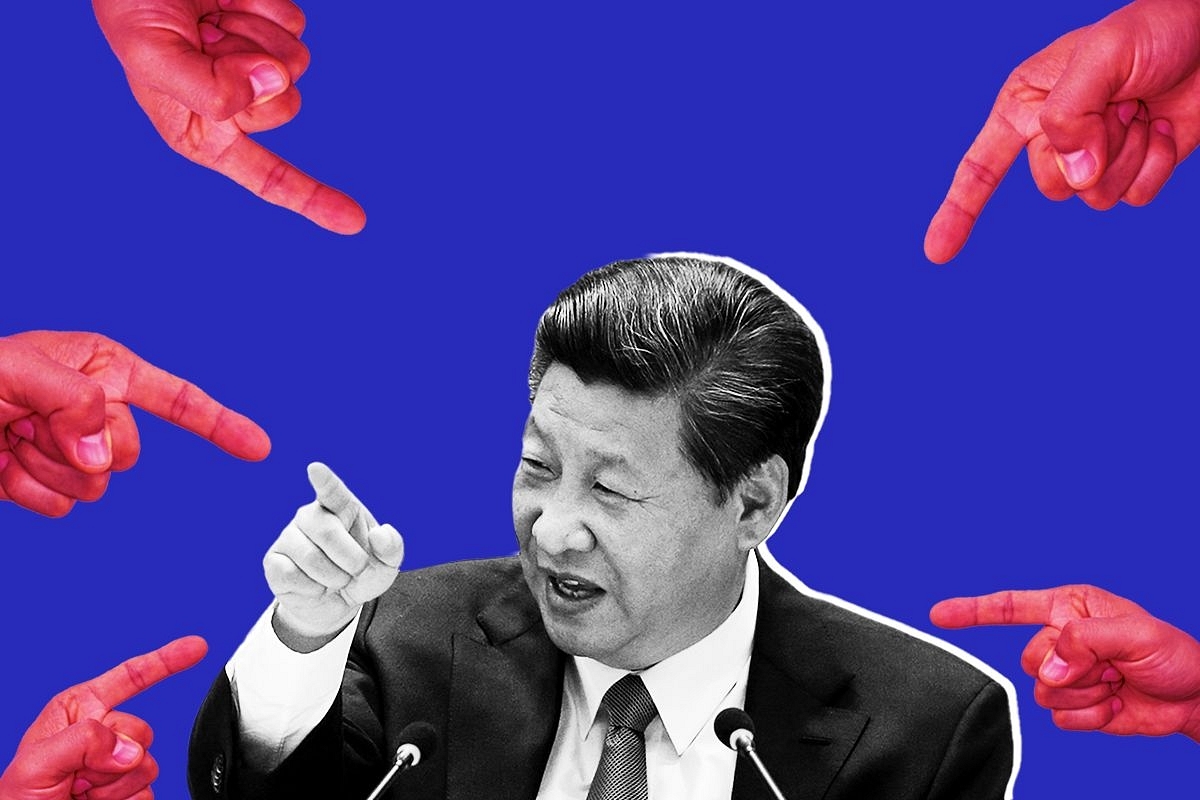News Brief
It's All In The Name: Why WHO Skipped Two Greek Alphabets While Naming 'Omicron Coronavirus Variant' Found In South Africa
- The global health organisation announced the new name of B.1.1.529 variant, skipping a letter that many observers expected to come next—"Nu"— as well as the subsequent Greek letter, "Xi".

Chinese President Xi Jinping. (Swarajya)
The discovery of a new version of the novel coronavirus, which was first identified in South Africa, caused concern among international health professionals, financial markets to tremble and the internet to be perplexed as to how the new moniker was chosen.
The World Health Organization named B.1.1.529, the new variant "Omicron" on 26 November, omitting 2 letters in the Greek alphabet.
The global health organisation announced the new name of B.1.1.529 variant, skipping a letter that many observers expected to come next—"Nu"—as well as the subsequent Greek letter, "Xi".
Omicron joins other alphabet-themed variants such as the Alpha, first found in the United Kingdom, the Beta variant from South Africa, the Gamma variant from Brazil and the Delta variant, detected in India.
Additionally, Epsilon, Zeta, Eta, Theta, Iota, Kappa, Lambda, and Mu are some of the other variants discovered so far.
However, it was suggested that WHO omitted Nu to avoid misunderstanding with the term "new," and skipped Xi because it is a part of Chinese President Xi Jinping's name.
These two letters are so far only two letters that the WHO has chosen not to use.
Paul Nuki, an editor from the London-based Telegraph, wrote in a tweet: “A WHO source confirmed the letters Nu and Xi of the Greek alphabet had been deliberately avoided. Nu had been skipped to avoid confusion with the word ‘new’ and Xi had been skipped to ‘avoid stigmatising a region’, they said. All pandemics inherently political!”
Earlier this year, WHO announced that coronavirus variants will be called by the letters from the Greek alphabet from that point forward, in an effort to simplify discussion and pronunciation while avoiding stigma.
The WHO announced the changes in response to concerns that the names proposed by experts were too difficult, claiming that the Greek alphabet's letters would be easier to say and remember, amid worries that calling the variants by the name of the countries where they were first discovered would cause more issues.
This time, when the agency chose the new name for the variant, which WHO classified as a variant of concern, many criticised this move while some thought that it is a clever idea.
In this case, American Republican senator Ted Cruz said, “If the WHO is this scared of the Chinese Communist Party, how can they be trusted to call them out the next time they're trying to cover up a catastrophic global pandemic?.”
While Wall Street Journal columnist Ben Zimmer wrote: “Kudos to the WHO for skipping over the potentially confusing Nu and Xi names and going straight to Omicron.”
However, later, he retweeted Nuki’s tweet and said: “Turns out there were other reasons for skipping Xi.”
Since the pandemic began, the WHO earned a reputation for being cautious about displaying matters related to China. Many people still remember how Director-General Tedros Adhanom Ghebreyesus praised the country in the initial days of the pandemic, more specifically during his visit to China in January 2020, for the openness to sharing information regarding Covid-19.
But later, many reports revealed how China hid information from the global agency, despite knowing the existence of the virus in November 2019.
There are some reports which also revealed how Chinese authorities silenced doctors like the coronavirus whistleblower late Dr Li Wenliang and other people who tried to reveal details about the situation in Wuhan, where the novel virus first emerged.
This year, following increased pressure from the United States for an investigation into a biotech facility in Wuhan, the WHO said a second stage of the international probe should include audits of Chinese facilities.
But it was Xi Jinping’s government that rejected the plan and warned that investigating Chinese labs as part of a larger investigation into the origins of the virus demonstrates disrespect and arrogance toward science.
However now when people pointed out the issue with Omicron naming, New York Post reported that a spokesperson from the UN health agency, Dr Margaret Harris, provided clarification on this matter.
The spokesperson said: “[For] Nu the reasoning was people would get confused thinking it was the new variant, rather than a name and XI because it’s a common surname and we have agreed [to] naming rules that avoid using place names, people’s names, animal, etc. to avoid stigma.”
Support Swarajya's 50 Ground Reports Project & Sponsor A Story
Every general election Swarajya does a 50 ground reports project.
Aimed only at serious readers and those who appreciate the nuances of political undercurrents, the project provides a sense of India's electoral landscape. As you know, these reports are produced after considerable investment of travel, time and effort on the ground.
This time too we've kicked off the project in style and have covered over 30 constituencies already. If you're someone who appreciates such work and have enjoyed our coverage please consider sponsoring a ground report for just Rs 2999 to Rs 19,999 - it goes a long way in helping us produce more quality reportage.
You can also back this project by becoming a subscriber for as little as Rs 999 - so do click on this links and choose a plan that suits you and back us.
Click below to contribute.
Latest